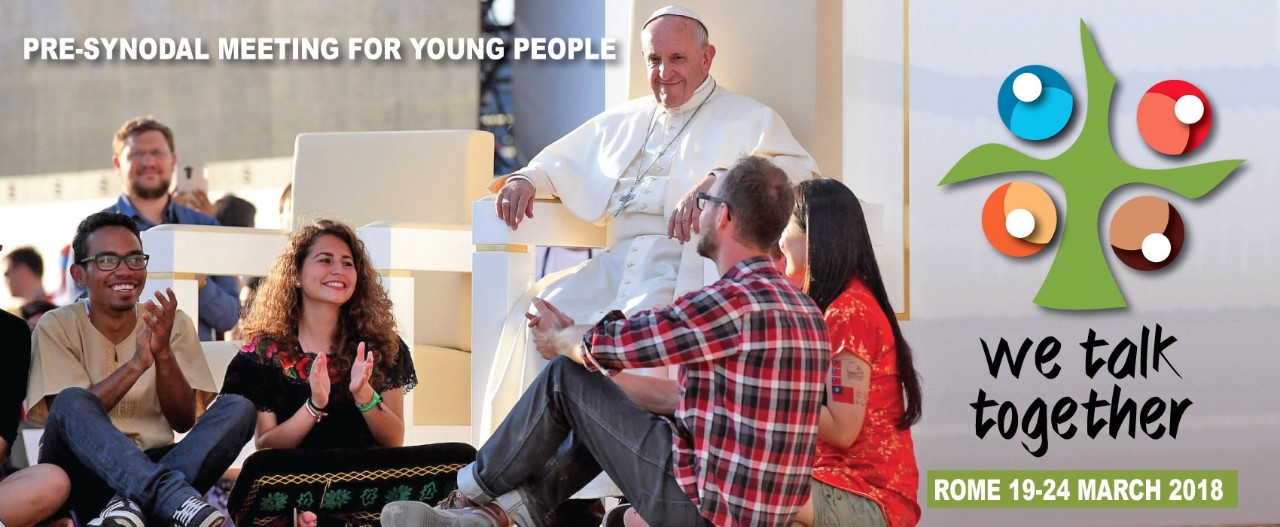The Work Out line for the Pre-Synodal Meeting

Introduction
1. The journey of the Synod of Bishops is a long, articulated process, made up of very important stages which, at each moment, involve various parts of the Church.
After the choice of topic was announced on 6 October 2016, the first stage began with the publication of the Preparatory Document on 13 January 2017, which, in addition to an important series of questions intended primarily for the episcopal conferences, the synods of the Eastern Catholic Churches and other ecclesial organizations, contained something new for the first time, namely, the expressed desire to listen to young people “through a website with questions on their expectations and their lives” (Preparatory Document, Introduction). From 2 to 9 April 2017, an International Meeting was held with leaders engaged in youth ministry worldwide, during which the synod journey was explained. From 11 to 15 September 2017, an International Seminar on the Present Situation of Young People was held with the participation of many experts and various young people.
The next step provides for the publication of the Work Document, which will collect the responses of the bishops and ecclesial organizations, a summary of the answers to the online questionnaire and the results of the Pre-Synodal Meeting. The General Assembly of the Synod of Bishops will take place from 3 to 28 October 2018, leading to the publication of a papal document, which will present the fruits of the entire journey.
2. From the very beginning, the Holy Father had a continual, intense desire directly to involve young people in this journey, for the Synod is not only for young people, but also, and above all, of young people.
This desire for involvement was also strongly emphasized in his letter sent to young people on 13 January 2017, as well as during the Prayer Vigil, held on 8 April, in preparation for the XXXII World Youth Day. On this occasion, the Pope stated that “in the Synod, the entire Church wants to listen to young people: to what they are thinking, to what they want, to what they criticize and to what they are sorry for.”
3. The desire sincerely and attentively to listen to young people finds its realization in the Pre-Synodal Meeting. During the Catechesis on 4 October 2017, Pope Francis said: “I would like to announce that the General Secretariat of the Synod of Bishops has organized a Pre-Synodal Meeting to take place from 19 to 24 March 2018, to which all young people from around the world are invited: young Catholics, young Christians from other denominations or other religions and young non-believers. This initiative is part of preparations to pave the way for the next Ordinary General Assembly of the Synod of Bishops, scheduled for October 2018, to treat the topic: Young People, the Faith and Vocational Discernment. With this journey, the Church wants to listen to the voice, sensitivities, the faith and also some of the doubts and criticism of the young; we must listen to young people. This is why the conclusions of the March meeting will be communicated to the synod fathers.”
4. The reason for and the intention of the Pre-Synodal Meeting are clearly indicated in the Meeting’s gathering in Rome of a significant representation of young people from all over the world.
The plan to be followed in its work, in keeping with the Preparatory Document, is divided into three parts:
• The first is devoted to examining thoroughly the actual situation of young people today;
• The second is related to young people's understanding of the key elements of the next Synod; and
• The third is aimed at engaging young people in the Church's formative and pastoral activity.
It is important to remember that the Preparatory Document remains the indispensable reference point for the various topics proposed in The Work Outline. Nor should it be forgotten that each participant, in a certain way and in various forms, will be representing a larger group (an episcopal conference, a synod of the Eastern Catholic Church, a Christian denomination, a religion, an association, a group, a movement, different situations in the life, many committed and working young people), and whose duty and right is to be an honest and loyal spokesperson for these groups.
5. The methodology for the work proposed at the Pre-Synodal Meeting is very simple.
According to a prearranged schedule, time will be set apart for an in-depth discussion of suggested topics in small language groups. At other times, the participants at the meeting will gather in plenary session to share the work being done, with the possibility for people to speak, so as to arrive at a collective summary, which will be the specific contribution of the Pre-Synodal Meeting to the Ordinary General Assembly.
The work outline is purposely brief and open to discussion so as to give maximum freedom of expression in both the small language groups and plenary sessions. The questions proposed are intended to generate and guide the dialogue.
6. Given the worldwide importance of this event, not to mention its aim to provide ways for young people to interact, the Pre-Synodal Meeting will be open to the “remote” participation of young people through computers.
At the synod’s official website www.synod2018.va, a great number of young people can be guaranteed a hearing along with the actual participants in the Pre-Synodal Meeting in Rome, which will make the Church’s ability to listen to young people today more comprehensive and significant.
7. The publication of this Work Outline, containing questions to guide the Pre-Synodal Meeting, is intended to provide a means for every young person and youth groups throughout the world to become involved, so that they can prepare themselves to make their contribution online during the Pre-Synodal Meeting.
Part One
THE CHALLENGES AND OPPORTUNITIES OF YOUNG PEOPLE IN THE WORLD TODAY
The first step in our journey is to take into consideration the historic circumstances and concrete situations in which young people today determine their identity.
The situation today in society, economics, politics, culture, religion and the Church certainly offers new opportunities, but, at the same time, also presents some unprecedented challenges. Globalization does not always lead to unity and equality, but, instead, oftentimes times worsens existing differences between continents and nations, thus creating for young people diverse conditions and possibilities in their growth and in their forming a unique identity and a sense of belonging in society.
Family relationships and interaction with peers, academics and university life, the world of work, financial matters, dealing with emotions and sexuality, the utilization of new technologies, the use of free time, self-expression through music and sports, confronting uneasy situations, poverty and marginalization, all these create a new way of understanding the world and planning life by creating an unprecedented sense of how the young look at life.
Without a doubt, our times are characterized by fragmentary living, confusion regarding values and a difficulty in belonging to a variety of races and cultures. Some ways of looking at the present situation can be likened to those in human life in the Bible, namely, the fragile nature of life can become the proper basis for seeking what is trustworthy; insecurity can provide a possible opening to a wider sense of existence; individualism can provide the reason to truly seek a real fraternity; mobility, arising from a desire for a homeland, is capable of fulfilling the intense longings of the human heart.
QUESTIONS FOR GROUP DISCUSSION
(1) The formation of personality. In these times, what relationships, emotional experiences, specific events and places primarily determine the identity of younger generations?
(2) Relationships with different people. What challenges and opportunities come to light in our increasingly interconnected, multicultural and interreligious world, where, unfortunately, differences and divisions are intensifying?
(3) Young people and the future. What dreams do young people have for themselves and for the society in which they live? How are they striving to realize these aspirations?
(4) The relationship with technology. How does technology today, with its new opportunities and unprecedented dangers, contribute to determining young people’s identity and way of life?
(5) The search for meaning in life. What relation exists between the daily lives of young people and their experience of the sacred, spiritual realities and religion?
Part Two
FAITH AND VOCATION, DISCERNMENT AND ACCOMPANIMENT
In the synodal journey, determining the specific ways in which young people understand the key elements of the faith, what the Church wants for them, and discerning the Lord’s plan in their life is decisive in creating a coherence between young people and the Gospel,
The Church’s treasure is precisely the faith which is received through grace. It is a gift which enables a person to participate in the life of God, to experience his love and to actually live an encounter with the Lord Jesus, who desires a full, abundant and eternal life for everyone, without exception. By means of the Church’s faith, a person gains entrance into the dynamic of salvation and remains grounded in the truth, living a happy and just relationship with God, which, in turn, leads to generous service to all.
Speaking of vocation first requires understanding the call to both love and fulfilment in life, which is concretely and uniquely expressed in each person, according to a specific choice of life. In Christian thinking, this applies to not only every baptized person, but also the non-baptized, since everyone is loved and created by God for himself. For this reason, shedding light on one's vocation is a task for everyone, especially young people.
Vocational discernment is an intense work, done interiorly, where a person seeks to grasp the meaning of one's existence, which is not merely a gift to welcome with joy, but also a task to undertake with commitment and responsibility. Vocational discernment is a journey of attentive listening, wise interpretation and a free and courageous choice of a specific form of life in the Church (lay, consecrated, priestly) and in the world.
Since discerning one’s vocation is neither simple nor automatic, the accompaniment of young people by persons who know how to walk this path, with humility and wisdom, is very important. Equally important is for young people, even among their peers, to find authentic people to accompany them on this path, people who act with freedom of heart, disinterestedness and full awareness of being collaborators of the God of love and joy.
QUESTIONS FOR GROUP DISCUSSION
(6) Young people and Jesus. How is the person of Jesus, as recounted in the Scriptures, perceived by the young people of the third millennium?
(7) Faith and the Church. How do young people today live their personal faith in Jesus? What is their relationship with the ecclesial community?
(8) The vocational sense of life. Is there a clear understanding in younger generations of their having a personal call and specific mission in the world?
(9) Vocational discernment. What tools can be useful and what moments are best suited to helping a young person make life’s basic choices in the Church and the world?
(10) Young people and accompaniment. What should be the characteristics of a trustworthy person, who is suited to accompanying young people today on life’s journey?
Part Three
THE CHURCH’S FORMATIVE AND PASTORAL ACTIVITY
An important task in the synod process is identifying the most effective ways to announce the good news to young people today. Young people, therefore, need to make concrete suggestions.
Decisive action needs to be taken in recapturing and reinforcing the enthusiasm and trust, long characterizing the Lord's disciples, so that, in these times, people can be apostles, engaged in the Church’s formative and pastoral activity towards young people. The Church, therefore, primarily wants every young person to become a “missionary disciple.”
In the first place, the Church needs to determine the appropriate manner to encounter young people today in their various experiences in life, so as to create, together with them, confidence and familiarity in the work of building, together with them, a more humane and just world and a Church which is more and more a beacon of the Kingdom of God to come.
Secondly, concrete suggestions are essential in finding ways for young people to be leading figures in this work and for them to be more involved in the renewal to be achieved in society and the Church. Young people are called to enrich the Church's vision of the world and history with a renewed sensitivity to the signs of the times, which are God’s appeal to the Church, to young people themselves and to all men and women of good will.
Finally, equally important is determining what areas of commitment are a priority in achieving a “vocational pastoral programme for young people” appropriate for these times.
The Church encounters young people in very many places, but the best ones need to be determined so as to accompany them. The Church proposes many initiatives, but, here too, their quality and consistency needs to be assessed. The Church has in place many instruments and forms of involvement, at various levels, but not all are suitable to attract the interest of young people.
QUESTIONS FOR GROUP DISCUSSION
(11) The Church’s manner of acting. What should be the characteristics of a Church which is enlightening, attractive and credible to younger generations, one which has the ability to engender respect and attractiveness in them?
(12) Young leading figures. What are the preferred areas, in both society and the Church, where young people, with their talents and enthusiasm, can really be involved in the mission of the Church today?
(13) Preferred places. What are the more important places, among others, for encountering young people where they are, and accompanying them and offering them the light of faith?
(14) The initiatives to be reinforced. What specific initiatives appear to be more appropriate to attract the interest of young people, so that they can fully grow as persons?
(15) Instruments to be used. Which approaches appear to be the most accessible and what are the most effective ways of generating among young people a sense of vocation, attentiveness to one’s neighbour and a grace-filled life?







